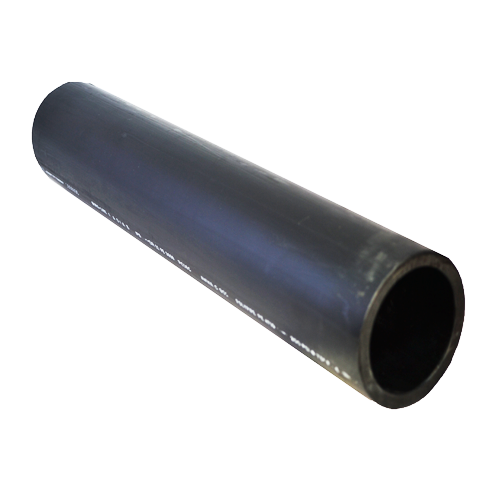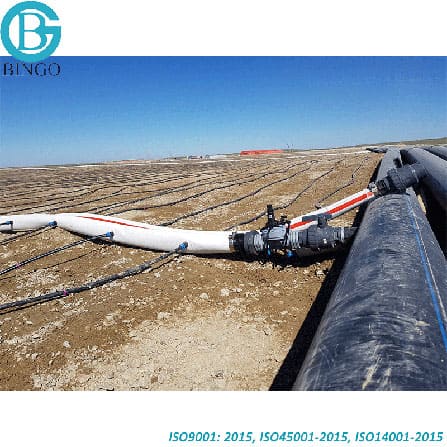Why Texas hdpe pipe manufacturer Is Leading in Advanced Pipe Solutions
A Comprehensive Guide to the Different Uses HDPE Pipe in Building And Construction and Industry
HDPE pipelines have actually emerged as a crucial part in contemporary construction and industrial applications. Their one-of-a-kind properties, such as resistance to rust and light-weight design, make them suitable for a wide variety of uses. From water systems to agricultural watering, HDPE pipes supply options that boost effectiveness and sustainability. Recognizing their varied applications is vital for professionals looking to optimize facilities. What certain benefits do these pipelines offer each sector?
Water and Circulation Equipments
Water supply and distribution systems are crucial parts of city infrastructure, usually depending on high-density polyethylene (HDPE) pipelines for their toughness and efficiency. These systems transport potable water from therapy centers to customers, making sure access and safety and security. HDPE pipes are preferred for their resistance to deterioration, chemicals, and severe temperature levels, which boosts their longevity and reduces maintenance expenses. Furthermore, their lightweight nature permits less complicated installment and transport, making them perfect for different city and country applications.
The versatility of HDPE pipes enables them to be installed in tight areas and around obstacles, minimizing the demand for considerable excavation (Midland TX HDPE Pipe Fittings in Stock). Their smooth interior surface area lowers rubbing losses, improving water flow prices. As cities proceed to expand, the demand for trustworthy supply of water systems boosts, placing HDPE pipelines as a lasting solution for contemporary facilities projects. Their tested performance history makes them a favored choice among engineers and urban coordinators alike
Wastewater Monitoring and Therapy
Effective wastewater administration and therapy are important for maintaining public health and wellness and ecological quality. HDPE pipes play an essential duty in this procedure because of their resilience, resistance to deterioration, and capacity to endure rough chemicals. These pipes are generally utilized in numerous applications, including sewer systems, stormwater drain, and wastewater treatment centers. Their lightweight nature promotes much easier installation and transport, decreasing labor prices and time.
Furthermore, HDPE pipes have a smooth interior surface that lessens friction loss, promoting effective circulation rates. They are additionally less vulnerable to leakages and failures compared to standard products, guaranteeing that impurities are had effectively. Their adaptability permits for versatility in different soil conditions, making them ideal for varied environmental settings. As sectors significantly focus on lasting techniques, making use of HDPE pipelines in wastewater monitoring systems lines up with objectives for decreasing ecological effect and boosting resource recuperation.
Agricultural Watering Solutions
In farming settings, efficient watering services are important for maximizing crop yields and handling water resources. HDPE (High-Density Polyethylene) pipelines play an essential role in contemporary watering systems as a result of their longevity, adaptability, and resistance to rust. Their capability to stand up to high pressures makes them perfect for both surface and subsurface watering applications, making certain consistent water circulation throughout fields.
Farmers can utilize HDPE pipelines in drip watering systems, which provide water directly to plant roots, minimizing read more wastefulness and advertising healthy and balanced development. Furthermore, these pipes are light-weight and very easy to mount, minimizing labor costs and setup time. Their lengthy life-span and low upkeep needs even more boost their appeal in farming methods.
HDPE pipelines are ecologically pleasant, as they can be recycled and do not seep hazardous chemicals right into the soil. This makes them a lasting choice for farmers intending to adopt eco-friendly agricultural methods while making the most of performance.
Industrial Applications and Processes
Convenience is a trademark of HDPE pipelines, making them important in numerous industrial applications and procedures. These pipelines are commonly used in chemical handling markets because of their excellent resistance to a vast range of harsh compounds. HDPE's lightweight nature, incorporated with high tensile strength, enables easy installation and lasting performance sought after atmospheres.
In the oil and gas field, HDPE pipes play an essential function in transferring hydrocarbons and gases, many thanks to their resilience and versatility - Pipe Supplier American Plastics Midland. Furthermore, they are used in mining operations for the transport of slurry and other products, where standard piping systems may fail
Furthermore, HDPE pipelines are progressively made use of in producing centers for water system lines and wastewater administration. Their capability to stand up to severe temperatures and pressures makes them ideal for a range of commercial procedures. Generally, HDPE pipes add substantially to effectiveness and safety throughout diverse industrial applications.
Stormwater Monitoring and Drain Systems
Stormwater monitoring and drain systems are vital components in city framework, created to manage excess rainfall and minimize flooding dangers. High-density polyethylene (HDPE) pipes are significantly used in these systems due to their resilience, flexibility, and resistance to deterioration. These pipelines effectively deliver stormwater away from populated locations, decreasing surface runoff and avoiding waterlogging.
HDPE's lightweight nature promotes easier installation, reducing labor prices and building and construction time. In addition, its resistance to chemicals and environmental stress factors guarantees longevity and integrity in various environments. Along with traditional drain applications, HDPE pipelines are also utilized in ingenious remedies such as green facilities, which consists of rainfall gardens and permeable pavements.

Frequently Asked Inquiries
How Does HDPE Pipe Contrast to PVC Pipe in Price?
Generally, HDPE pipeline tends to be much more pricey than PVC pipe because of its improved toughness and flexibility. Nevertheless, lasting cost considerations, such as upkeep and life-span, may favor HDPE in particular applications.

What Is the Life Expectancy of HDPE Water Lines Under Varying Conditions?
HDPE pipes normally have a life-span of 50 to 100 years, depending on environmental conditions, installation practices, and usage. Factors such as temperature, soil kind, and direct exposure to chemicals can significantly influence their sturdiness.
Can HDPE Water Lines Be Recycled After Use?
Yes, HDPE pipes can be recycled after usage. The reusing procedure includes melting down the material, permitting it to be repurposed right into new items, therefore advertising sustainability and lowering ecological effect connected with plastic waste.
Exist Any Type Of Particular Installation Challenges With HDPE Pipes?
Installment difficulties with HDPE pipes consist of appropriate jointing methods, guaranteeing ample trench problems, and managing thermal growth. Furthermore, skilled labor is called for to take care of customized devices, which can complicate the setup procedure in numerous atmospheres.

What Qualifications Should I Seek When Investing In HDPE Water Lines?
When purchasing HDPE pipelines, one must look for qualifications such as ASTM, AASHTO, and ISO, which verify quality and conformity with industry criteria, ensuring resilience and efficiency in various applications. - Pipe Manufacturing Midland TX